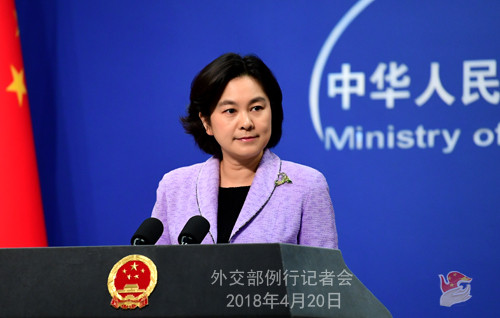Beijing says hegemony behind US actions


Hua Chunying, Foreign Ministry spokesperson, speaks at the Regular Press Conference in Beijing on April 20, 2018. [Photo/Ministry of Foreign Affairs of the People's Republic of China]
Demanding another nation open up while shutting the door called unfair
Beijing has warned that hegemonic thinking is behind the US Treasury Department's plan to restrict sensitive Chinese investments in the country's high-tech sector.
Washington has taken a slew of moves recently, and what is behind the US restrictions is actually protectionism, Foreign Ministry spokeswoman Hua Chunying told a daily news conference in Beijing on Friday.
US Assistant Secretary for International Markets and Investment Policy Heath Tarbert told a forum on Thursday that Treasury officials are mulling ways to restrict sensitive Chinese investments by invoking an emergency powers law and bringing forward some security review reforms for corporate acquisitions, Reuters reported.
Hua said the United States has demanded China further open up its market while imposing restrictions on Chinese investment in the US, a move that fails to live up to the principle of fairness and reciprocity and is an unreasonable, hegemonic approach in scientific fields.
Also, the pace of China's advancing technological innovation will not be stopped because of the noise and interference, Hua added.
Teng Jianqun, director of the Department for American Studies at the China Institute of International Studies, noted that behind the agenda of the administration of US President Donald Trump is its concern about China bringing changes to the existing global business order led by the US.
Washington still is resisting China's remarkable boost in its own innovation capability in the high-tech sector and its advancing industrialization and transformation from medium-and low-end production status in the international production chain, Teng said.
A US congressional committee report on Thursday claimed that the Chinese government is possibly supporting business espionage conducted by some Chinese companies.
Hua Chunying responded that it is extremely irresponsible and dangerous if US policies are based only on possibilities.
Traps and conspiracies plague minds dominated by Cold War thinking and belief in a zero-sum game, while a proactive and cooperative mindset helps create new opportunities and converts challenges into chances, Hua added.
China hopes that some people in the US will update their ideas about international relations and follow the trend of the times rather than pushing against it, she said.
MOST POPULAR
- 1 China to give visa-free treatment to another 9 countries
- 2 China fully opens manufacturing sector to foreign investors in landmark opening up move
- 3 China's import expo attracts record-breaking participating countries, exhibitors
- 4 China's door opening even wider to foreign visitors, businesses
- 5 China revises rules to ease foreign strategic investment in listed firms
Editors' Picks
 Infographic:
China's public holidays for 2025
Infographic:
China's public holidays for 2025
 Infographic:
Basic facts of APEC
Infographic:
Basic facts of APEC
 Infographic:
Wrapping up the 7th CIIE: Data recap
Infographic:
Wrapping up the 7th CIIE: Data recap




